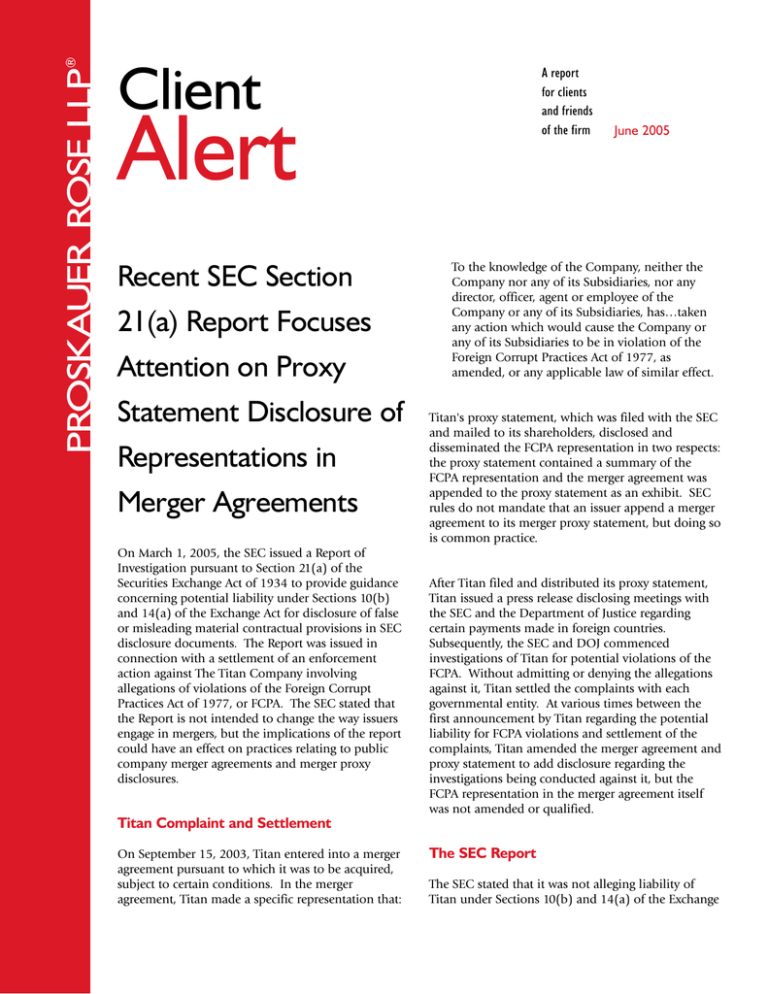
®
PROSKAUER ROSE LLP
Client
A report
for clients
and friends
of the firm
Alert
Recent SEC Section
21(a) Report Focuses
Attention on Proxy
Statement Disclosure of
Representations in
Merger Agreements
On March 1, 2005, the SEC issued a Report of
Investigation pursuant to Section 21(a) of the
Securities Exchange Act of 1934 to provide guidance
concerning potential liability under Sections 10(b)
and 14(a) of the Exchange Act for disclosure of false
or misleading material contractual provisions in SEC
disclosure documents. The Report was issued in
connection with a settlement of an enforcement
action against The Titan Company involving
allegations of violations of the Foreign Corrupt
Practices Act of 1977, or FCPA. The SEC stated that
the Report is not intended to change the way issuers
engage in mergers, but the implications of the report
could have an effect on practices relating to public
company merger agreements and merger proxy
disclosures.
Titan Complaint and Settlement
On September 15, 2003, Titan entered into a merger
agreement pursuant to which it was to be acquired,
subject to certain conditions. In the merger
agreement, Titan made a specific representation that:
June 2005
To the knowledge of the Company, neither the
Company nor any of its Subsidiaries, nor any
director, officer, agent or employee of the
Company or any of its Subsidiaries, has…taken
any action which would cause the Company or
any of its Subsidiaries to be in violation of the
Foreign Corrupt Practices Act of 1977, as
amended, or any applicable law of similar effect.
Titan's proxy statement, which was filed with the SEC
and mailed to its shareholders, disclosed and
disseminated the FCPA representation in two respects:
the proxy statement contained a summary of the
FCPA representation and the merger agreement was
appended to the proxy statement as an exhibit. SEC
rules do not mandate that an issuer append a merger
agreement to its merger proxy statement, but doing so
is common practice.
After Titan filed and distributed its proxy statement,
Titan issued a press release disclosing meetings with
the SEC and the Department of Justice regarding
certain payments made in foreign countries.
Subsequently, the SEC and DOJ commenced
investigations of Titan for potential violations of the
FCPA. Without admitting or denying the allegations
against it, Titan settled the complaints with each
governmental entity. At various times between the
first announcement by Titan regarding the potential
liability for FCPA violations and settlement of the
complaints, Titan amended the merger agreement and
proxy statement to add disclosure regarding the
investigations being conducted against it, but the
FCPA representation in the merger agreement itself
was not amended or qualified.
The SEC Report
The SEC stated that it was not alleging liability of
Titan under Sections 10(b) and 14(a) of the Exchange
Act, but was using the Titan matter to provide guidance
concerning potential liability for materially misleading
disclosures of contract provisions in SEC filings, whether it
be through summaries in a disclosure document, attaching
contracts as exhibits, incorporating contracts by reference or
otherwise. Even though shareholders of Titan were not
third-party beneficiaries of the FCPA representation and the
merger agreement was not prepared as a disclosure
document, the Report concluded that the inclusion of the
representation in Titan's proxy statement constituted a
disclosure to investors. Therefore, since a reasonable
investor could determine that the representation described
the actual state of affairs of the company and such
information could be found to be material, Titan was
potentially liable for disclosure of false or misleading
information to investors.
Implications
The SEC's warning in the Report is likely to have lasting
implications on public company merger agreements and
merger proxy statement disclosures. Representations,
typically a matter of private contract, could now lead to
liability under Sections 10(b) and 14(a) of the Exchange Act.
Representations serve different purposes—disclosure and/or
risk allocation. Where representations serve only the latter
function as between the contract parties, reliance by
shareholders may be misplaced. As a result of the Report,
issuers must have a heightened sensitivity to how contract
provisions are drafted and summarized in SEC filings.
Additionally, issuers should ensure that disclosures made are
internally consistent within the filing or with disclosures in
other filings. This was not done by Titan—while the merger
agreement and proxy statement were revised to reflect the
complaint against Titan, the FCPA representation remained
unchanged.
Additionally, disclaimers in merger proxy statements aimed
at avoiding liability for representations in merger agreements
are likely to become commonplace. Below is a sample
disclaimer from a document recently filed with the SEC:
The description of the proposed Merger described in this
report does not purport to be complete and is qualified
in its entirety by reference to the Merger Agreement,
which is filed as Exhibit 2.1 to this report and
incorporated herein by reference. The Merger Agreement
has been included to provide investors and security
holders with information regarding its terms. It is not
intended to provide any other factual information about
[the issuer]. The Merger Agreement contains
representations and warranties the parties thereto made
to and solely for the benefit of each other. The assertions
2
embodied in those representations and warranties are
qualified by information in confidential disclosure
schedules that the parties have exchanged in connection
with signing the Merger Agreement. Accordingly,
investors and security holders should not rely on the
representations and warranties as characterizations of
the actual state of facts, since they were only made as of
the date of the Merger Agreement and are modified in
important part by the underlying disclosure schedules.
Moreover, information concerning the subject matter of
the representations and warranties may change after the
date of the Merger Agreement, which subsequent
information may or may not be fully reflected in [the
issuer's] public disclosures.
Nevertheless, issuers should be aware that the Report
indicated that such a general disclaimer may not be
sufficient to exculpate issuers in possession of material
information that is contradictory to representations made.
In addition, the SEC staff is likely to comment on such
disclaimers where they suggest that not all material
information is included in a disclosure document. Over
time, a form of disclaimer that satisfies both issuers and the
SEC is likely to be developed.
NEW YORK
z
BOSTON
LOS ANGELES
z
z
B O C A R AT O N
NEW ORLEANS
z
WA S H I N G T O N
z
N E WA R K
PA R I S
Proskauer's Capital Markets Group has extensive experience in
all types of capital markets transactions, including both
registered and exempt transactions. We represent domestic
and foreign private issuers and underwriters in registered
transactions and exempt Rule 144A, Regulation S and
Regulation D transactions. We provide the full range of
services required by our domestic and international clients to
facilitate initial public offerings, follow-on offerings,
investment-grade, convertible and high-yield debt offerings and
real estate securities transactions.
Julie M. Allen
212.969.3155 – jallen@proskauer.com
Richard H. Rowe
202.416.6820 – rrowe@proskauer.com
Allan R. Williams
212.969.3220 – awilliams@proskauer.com
Proskauer Rose is an international law firm that handles a full spectrum of legal
issues worldwide.
This publication is a service to our clients and friends. It is designed only to give general information on the developments actually
covered. It is not intended to be a comprehensive summary of recent developments in the law, treat exhaustively the subjects covered,
provide legal advice or render a legal opinion.
© 2005 PROSKAUER ROSE LLP. All rights reserved.



